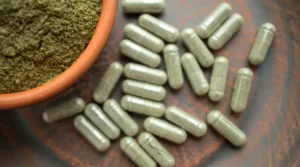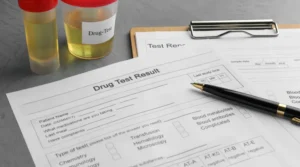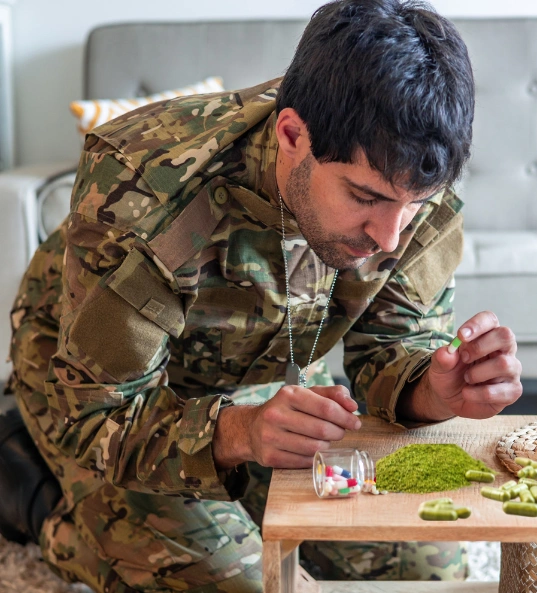Find Kratom Drug Test Military Answers and Guidance
Can Military Drug Tests Detect Kratom?
Military drug testing can feel confusing, especially when you’re hearing different “panel” lists and rumors online.
This page from TriCareRehabs.com is a general overview of how DoD’s drug-testing program is structured, how kratom fits into DoD supplement and readiness policy, and what practical next steps can look like if you’re worried about a test or a result.
Policies and lab scopes can change over time, and details can vary by Service, unit, and the circumstances of the test.
Read our full resource to learn more, and visit our takeaways for a quick summary.
Military drug-testing and discipline policies can vary by Service, command, location, and the facts of a situation. This page is general educational information – it is not legal advice, not medical advice, and not official Department of Defense (DoD) guidance. If you’re facing possible adverse action, consider speaking with your chain of command and legal counsel/JAG for situation-specific direction. (DoD drug testing is governed by DoD/Service policy and implementing instructions.)
If you or someone else is in immediate danger, call 911. If you’re in the U.S. and need urgent emotional support, call/text 988.
Quick Takeaways – TL;DR
-
The DoD Military Personnel Drug Abuse Testing Program is built primarily around urinalysis (urine specimen collection), with specific “collection premises” (the reason for the test) and standardized laboratory procedures.
-
Kratom (mitragynine/7-hydroxymitragynine) is treated as prohibited for Service members in the DoD dietary supplement policy ecosystem (via DoDI 6130.06 and the OPSS prohibited ingredients list).
-
A DoD memo directed Military Departments to adopt punitive orders/regulations addressing kratom products (effective date referenced in the memo), and Services may issue their own implementing guidance (for example, Navy/Marine Corps guidance addresses kratom).
-
Whether kratom is detected in “routine” testing is a separate question: routine urinalysis focuses on analytes described in DoD technical procedures; substances outside that scope generally require special testing pathways and will vary by circumstances.
-
If you’re notified of a positive result or you’re worried about risk: ask whether the result reflects confirmatory testing, ask what collection premise was used, and involve the right supports (command/medical/legal) based on your situation.
-
If you’re struggling with kratom or other substance use, support is available. Seeking help early is a health-first step.
How Long Does Kratom Remain Detectable in Military Testing?
A lot of pages give day-by-day “windows.” The problem is that detection depends on many factors you can’t reliably control or even know for sure, including product composition, dose pattern, individual metabolism, and the specific test method/sample.
Even NIH notes research on kratom’s effects and safety is still developing, and product variability/contamination is a known issue.
Because of that uncertainty – and because kratom is treated as prohibited in DoD supplement policy – it’s safer and more accurate to avoid relying on detection-window estimates to make decisions.
If you’re experiencing symptoms (especially severe ones), seek medical care. If you’re trying to understand policy risk, focus on policy and process, not “timelines.”
This is particularly important because detection windows depend heavily on a number of factors: dose, frequency of use, individual metabolism, body fat, and which bodily sample is used (urine, blood, saliva, or hair).
What is Kratom and What Are its Effects?
Kratom, from the plant Mitragyna speciosa, is native to Southeast Asia and is used for its stimulant and opioid-like properties. Commonly used as a dietary supplement, Kratom has active compounds mitragynine and 7-hydroxymitragynine that bind to opioid receptors in the brain.
Many use kratom for pain relief, anxiety and energy. But its legal status and effects are controversial especially in the military.
Is Kratom Legal for Military Personnel?
Within DoD’s dietary supplement policy framework, DoDI 6130.06 states: Service members will not use products containing ingredients on the DoD Prohibited Dietary Supplement Ingredients List, and OPSS maintains that list in compliance with the instruction.
OPSS also publishes kratom-focused updates and warnings for the military community, and Service-specific messages may add additional clarity (for example, Navy/Marine Corps guidance addresses kratom and related compounds).
In addition, a DoD memo addresses the adoption of punitive orders/regulations related to kratom products, emphasizing an enforceable, readiness-oriented approach (implementation details can vary by Service).
Bottom line: Even when a substance is “legal” in some civilian jurisdictions, DoD/Service policy can still treat it as prohibited for Service members.

Does Kratom Show Up on a Military Drug Test?
This is where a lot of online confusion happens.
DoD technical procedures define what DoD forensic labs are authorized to screen and confirm under the routine military drug testing program.
Kratom alkaloids (such as mitragynine/7-hydroxymitragynine) are not described as routine analytes in the same way as the core substances covered by the standard DoD tables.
When a command has a need to test for a substance outside routine scope, DoD technical procedures describe special testing request pathways (“other special testing requests”), which can involve coordination steps and approved laboratories.
Practical takeaway: A substance can be prohibited even if it’s not a routine analyte in standard urinalysis – and a command’s ability to pursue specialized testing can vary by circumstances.
Knowing the Types of Military Drug Tests for Kratom

For most Service members, what people call a “military drug test” is the DoD urinalysis program. DoD policy recognizes multiple collection premises (the “why” behind a collection), and the premise can matter for process and downstream handling.
Examples commonly referenced in DoD policy include inspection (random), probable cause, consent, medical, rehabilitation, mishap/safety, and command-directed testing.
If you’re trying to understand your situation, a practical, non-confrontational question is:
“What collection premise/code was used for this test?”
Can the Military Test Specifically for Kratom?
Yes, the military can test for kratom if needed. Although not part of the standard drug test panel, specialized labs can detect kratom alkaloids in urine, blood or hair samples. If a service member is suspected of using kratom, the military may order a targeted test especially if there are behavioral or health concerns related to its use. It’s recommended for service members to avoid using kratom because of its prohibition and risks.
Why Do OPSS and DoD Policy Flag Kratom for Service Members?
Kratom is banned for military personnel for several reasons:
- Potential for Addiction: Kratom has effects similar to other opioid pain relievers, and long-term use can lead to dependency and withdrawal symptoms similar to traditional opioids.
- Adverse Health Effects: Side effects include nausea, dizziness, drowsiness, constipation, and in some cases hallucinations or seizures.
- No FDA Regulation: The FDA does not regulate kratom, so there’s no standardized dosage or purity level, increasing the risk of contamination or overdose.
- Impaired Performance: The military requires personnel to be in top physical and mental condition. Kratom’s potential psychoactive effects can impair judgment, reaction time, and overall operational readiness, putting service members and their units at risk.
- Negative Legal and Career Consequences: Even if kratom doesn’t show up on standard drug tests, being caught using it can result in disciplinary action, including discharge from the military.

The Impact on Military Readiness and a Note on Related Supplements
NIH also notes reported side effects (including serious but rarer reports) and the risk of dependence/withdrawal in some people. (see links to sources in the Resource and References section at the article conclusion)
From a military-readiness standpoint, the concern is not only health risk but also unpredictable effects, product variability, and supplement contamination/mislabeled ingredients – especially in products marketed as “natural,” “herbal,” or “legal alternatives.” DoD’s supplement policy framework is built to reduce these risks.
A note on “workarounds” (Spice, hemp/CBD, delta-8, etc.)
If you’re here because someone suggested kratom or another product as a “safer alternative,” be cautious: OPSS routinely warns that many products marketed as alternatives can still carry serious policy and health risk.
If you’re wondering about synthetic cannabinoids specifically, see Does Spice show up on a military drug test?
Common Drugs Detected in Military Tests
Military drug tests test for a wide range of substances to ensure service members are fit for duty. Commonly detected drugs include marijuana, cocaine, methamphetamines, and various prescription medications.
Opioids like hydrocodone and oxycodone are also frequently detected in these tests because of their potential for abuse and dependency.
In addition to these substances, military drug tests do detect Spice and K2, as well as similar synthetic cannabinoids, which are often used as alternatives to marijuana. Designer drugs like bath salts and flakka are also on the radar because of their dangerous and unpredictable effects.
Although not part of the standard panel, kratom, a plant-based substance with opioid like effects, can be detected in specialized military drug tests if there’s a reason to suspect use.
False Positives and Confirmatory Testing for Kratom in the Military
DoD technical procedures describe a workflow that includes initial testing (screening) and confirmatory testing using standardized lab methods and cutoffs, depending on the substance/class.
The details are technical, but the big picture is: an initial screen is not the same thing as a confirmed result.
If you’re notified of a positive, it’s reasonable to ask whether what you’re being told reflects confirmed results and what documentation is needed for any lawful prescriptions or medical context.
What Happens If a Service Member Is Caught Using Kratom?

If a service member is caught using kratom – or any other prohibited substances for that matter – the consequences can be severe. Disciplinary action may include:
- Non-Judicial Punishment (NJP): Under Article 15 of the Uniform Code of Military Justice (UCMJ) service members may face NJP which can result in rank reduction, loss of pay or extra duties.
- Court-Martial: In severe cases service members may face a court-martial and imprisonment or dishonorable discharge.
- Administrative Separation: The military may separate the service member for drug abuse or failure to meet conduct standards.
Service members can go to the FAQs for more information on kratom.
If You are Worried About a Test Result: Practical Next Steps
If you’re stressed right now, you’re not alone – and you don’t have to guess.
-
Ask what the collection premise was (inspection/random, probable cause, etc.).
-
Ask whether the result you’re hearing about reflects confirmatory testing (screen vs confirmation are not the same).
-
Document anything relevant and lawful, especially prescriptions and care you’re receiving through legitimate medical channels.
-
Use the right support for the right question:
-
Chain of command / installation DDR for process and premise basics (what code, what happens next).
-
Medical for health concerns, medication lists, and symptoms.
-
Legal assistance/JAG if adverse action is being considered (not legal advice).
-
-
If substance use is becoming hard to control, consider confidential support and treatment resources early.
Get Help Finding Kratom Treatment Options Today
Kratom is a controversial substance for military personnel. While it may work for some users, the risks far outweigh any benefits for service members. DoD has made it clear kratom is not allowed and service members who use it will face disciplinary action and career consequences.
Since kratom doesn’t always show up on drug tests, some may think they can use it with impunity but the military can test for it if they want to. To stay compliant and protect their career service members should avoid kratom and seek approved alternatives for pain, stress and fatigue.
In the end the best choice for military personnel is to follow policy, prioritize health and performance and stay informed about what they put in their body. If you are struggling with kratom abuse and are concerned it is going to effect your ability to serve, Tricare Rehabs is here to help.
We can help connect you with specialized military addiction treatment programs and get you back on the path of a happier, healthier life. Reach out to us to learn more today.
All calls are kept confidential, so please get options for support today!
FAQs on Kratom Testing and Use in the US Armed Forces
Is kratom “banned” in the military?
Many DoD/Service policies treat kratom as prohibited for Service members within the dietary supplement policy framework, and DoD has addressed the adoption of punitive orders/regulations related to kratom products. Implementation details can vary by Service and command.
Does kratom show up on a military drug test?
Routine DoD urinalysis focuses on analytes described in DoD technical procedures. Testing for substances outside that scope generally requires special testing request pathways and depends on circumstances and approved lab capability.
Can a command test specifically for kratom?
DoD technical procedures describe special testing request pathways for substances outside routine analytes. Whether that happens in a specific case varies by Service, circumstance, and available approved testing.
What drugs does the military test for?
It depends on DoD technical guidance and can evolve. For a practical overview, see further resources from TriCareRehabs.com on military drug testing standards and procedures for 2026.
Do military drug tests test for alcohol?
Alcohol is typically handled under separate policies and context-specific testing; it’s not accurate to assume routine urinalysis equals routine alcohol testing in terms of the US Military protocols.
What happens if I’m told I tested positive?
First, ask whether the result is confirmed and what the collection premise was. Then, involve medical/command/legal support as appropriate for your situation.
If kratom use is becoming hard to stop, what should I do?
You’re not alone. Consider talking with a qualified medical professional and exploring treatment options early. If you want help navigating TRICARE-friendly options, we can help you prepare questions to ask providers (coverage varies).
- EMDR Treatments for Substance Abuse in the Military - April 29, 2025
- Do Military Drug Tests Test for Alcohol? - April 1, 2025
- What is a Veteran Life Coach? - March 28, 2025
References and More Resources (Updated Jan 2026)
Department of Defense. (2025). DoD Instruction 1010.01: Military Personnel Drug Abuse Testing Program (MPDATP) (Incorporating Change 2, August 21, 2025). https://www.esd.whs.mil/Portals/54/Documents/DD/issuances/dodi/101001p.pdf
Department of Defense. (2024). DoD Instruction 1010.16: Technical Procedures for the Military Personnel Drug Abuse Testing Program (MPDATP). https://www.esd.whs.mil/Portals/54/Documents/DD/issuances/dodi/101016p.pdf
Department of Defense. (2022). DoD Instruction 6130.06: Use of Dietary Supplements in the Department of Defense (Incorporating Change 1, July 19, 2022). https://www.esd.whs.mil/Portals/54/Documents/DD/issuances/dodi/613006p.pdf
Office of Dietary Supplements, Operation Supplement Safety (OPSS). (n.d.). DoD Prohibited Dietary Supplement Ingredients List. https://www.opss.org/dod-prohibited-dietary-supplement-ingredients
Operation Supplement Safety (OPSS). (2025, October 7). Kratom and 7-OH: Significant risks to health. https://www.opss.org/article/kratom-and-7-oh-significant-risks-health?
Under Secretary of Defense for Personnel and Readiness. (2025, September 15). Adoption of punitive general orders or regulations to address use of Kratom products [Memorandum]. https://www.opss.org/sites/default/files/uploads/documents/2025/09/15/Adoption%20of%20Punitive%20General%20Orders%20or%20Regulations%20to%20Address%20Use%20of%20Kratom%20Products.pdf
Office of the Law Revision Counsel, U.S. House of Representatives. (2026). 10 U.S.C. § 815 (Article 15): Commanding officer’s non-judicial punishment. https://uscode.house.gov/view.xhtml?edition=prelim&req=granuleid%3AUSC-prelim-title10-section815
National Center for Complementary and Integrative Health. (2022, April). Kratom. National Institutes of Health. https://www.nccih.nih.gov/health/kratom
- EMDR Treatments for Substance Abuse in the Military - April 29, 2025
- Do Military Drug Tests Test for Alcohol? - April 1, 2025
- What is a Veteran Life Coach? - March 28, 2025